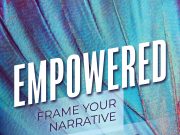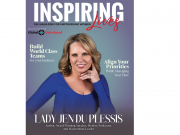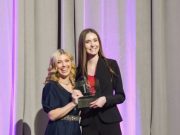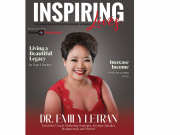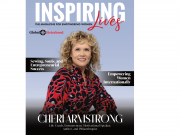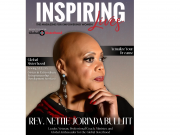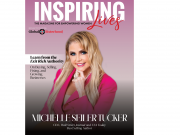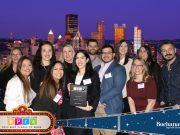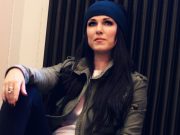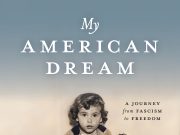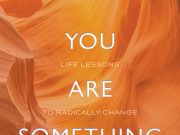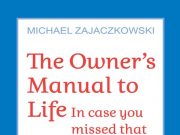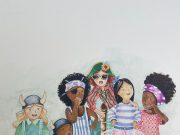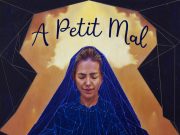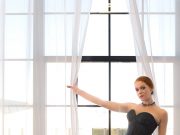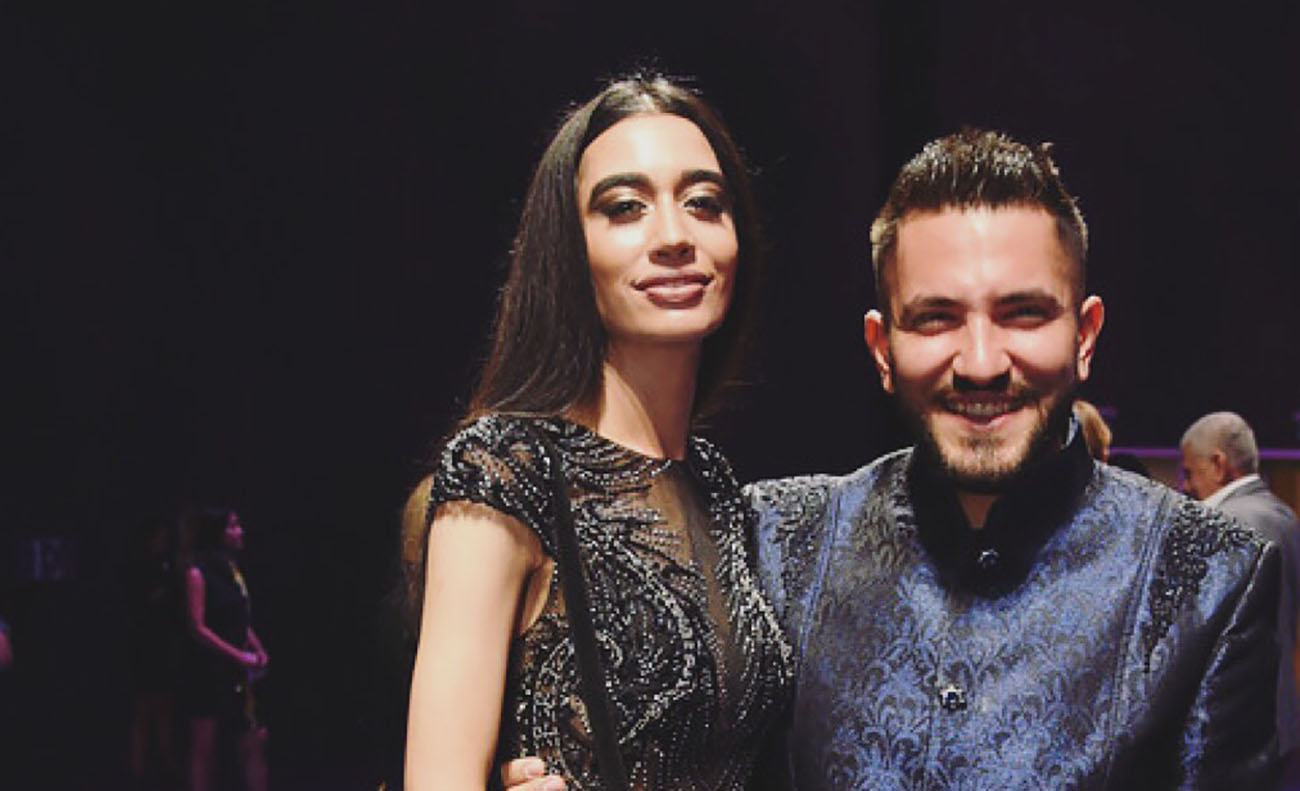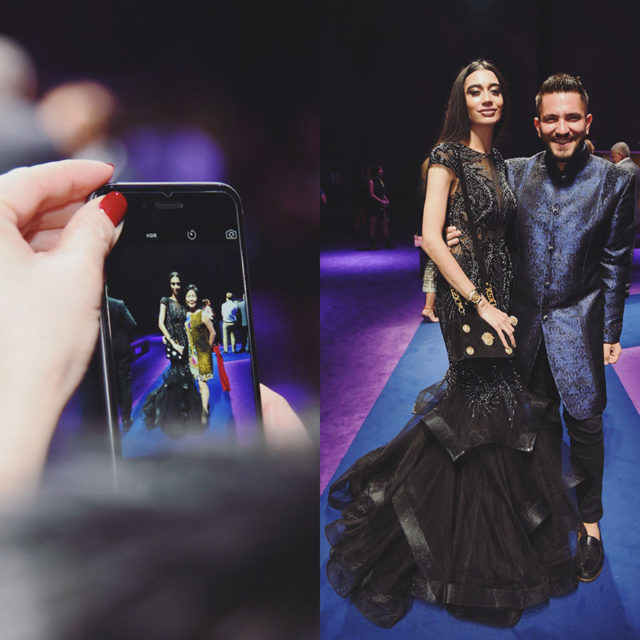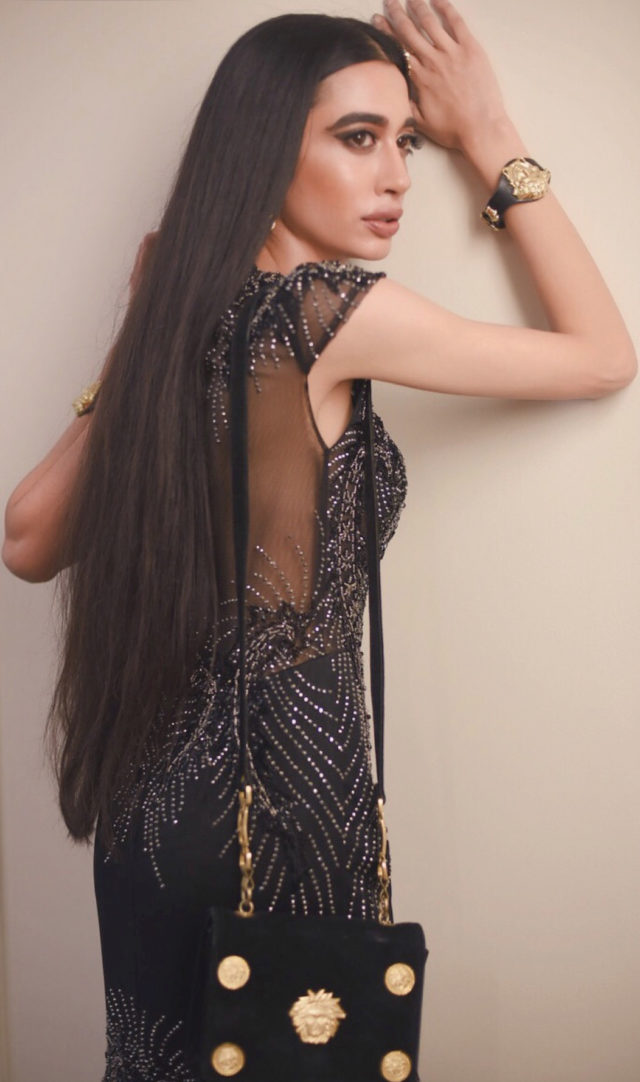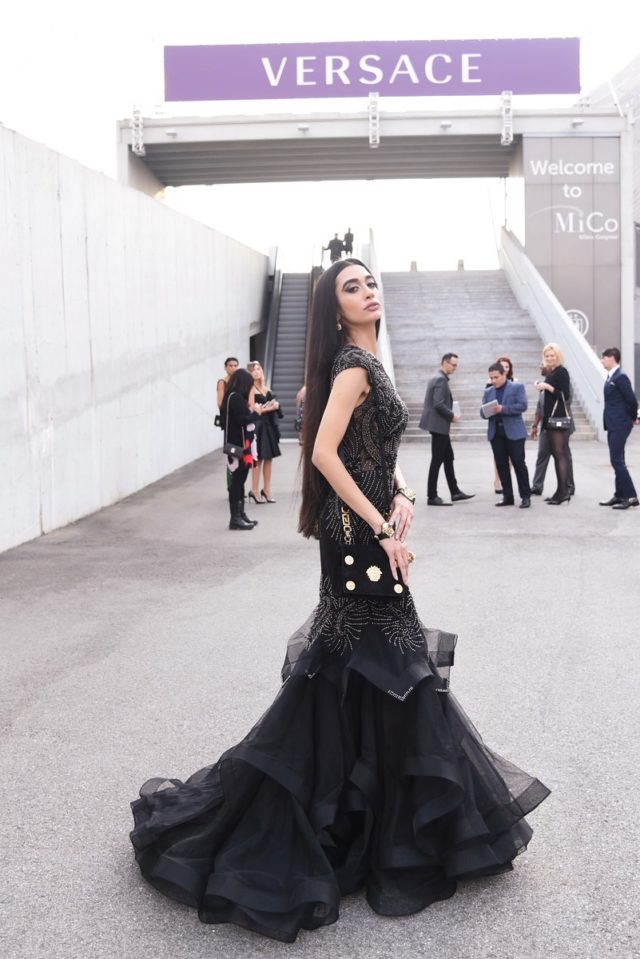You may have seen model Farah Zulaikha’s face in VOGUE, Elle, or Seventeen, but the breadth of her interests extend beyond fashion. She is a humanitarian, writer, television host, and biomedical researcher, as well as a philanthropist. Zulaikha participates in charity opportunities globally, not only acting as an ambassador to multiple charitable organizations but also helping with her family’s self-funded medical camps. Giving runs in her family.
Dr. Shellie spoke with Zulaikha about how her heritage and her experience as a New Yorker and a domestic violence shelter volunteer shaped who she is today.
Dr. Shellie: Farah, you are a lovely young woman, a model, and many people probably don’t know this, but as a 14-year-old, you worked in a domestic violence shelter in New York City. You connected with the victims and comforted them. You saw first-hand what this can do to a family, and we both know that it happens to more people than we would like to think in our modern society. Why do you think people don’t want to talk about domestic violence?
Zulaikha: That was an amazing experience, being able to help those people. And you’re right. People don’t want to talk about it. If you talk about any other cause, really, about children and hunger, about cancer, someone will stand up and say “I have been there, and I survived.”
Dr. Shellie: Right. It’s the same thing with the homeless population that I’ve worked with. I’ve worked with the Homeless Children’s Education Fund for ten years, and that’s what we always say. It’s like there’s not somebody who can just stand up and say, “I was homeless,” because of the stigma attached.
Zulaikha: It’s so true.
Dr. Shellie: And the same with domestic violence. Absolutely.
Zulaikha: Right. It’s this idea that it’s the undesirables in the society.
Dr. Shellie: Yes.
Zulaikha: People also think that a certain type of person becomes abused or homeless. And that’s not true. There are women who are and men also. Victims of domestic violence come from all socioeconomic levels. It’s not just the poor—
Dr. Shellie: Yes.
Zulaikha: —or junkies. People who have doctorates end up homeless.
Dr. Shellie: Yes.
Zulaikha: And highly educated people also become victims of domestic violence. One of the women in the shelter I was working in was a doctor. She drove a Mercedes. She drove an S class at that, but it didn’t mean anything. She needed help. She and her husband were respected people…I don’t want to call them “offenders”—I don’t believe that anybody is a bad person.
Dr. Shellie: Right.
Zulaikha: I just feel like people who are hurting hurt other people.
Dr. Shellie: Yes.
Zulaikha: She would get so upset and say, “I can’t believe this happened. I must have never been loved in my life. This was the only man I ever knew.” So I told her, “I don’t think that he didn’t love you. I think that
he just didn’t know how to love anyone, including himself.”
Dr. Shellie: It’s wonderful that you were so insightful.
Zulaikha: Thank you. It’s something that happened to him that made him incapable of expressing himself appropriately. We’re all human, and no one starts out that way. It’s all learned behavior.
Dr. Shellie: Because this is learned behavior, do you think it can be reversed?
Zulaikha: I totally believe that. I think people can change. You shouldn’t necessarily count people out, even when they’ve done wrong, but at the same time, the priority should always be on the victim, to preserve their well‑being and self-esteem. And you can’t break yourself trying to fix somebody else who’s broken.
Dr. Shellie: What happened if someone completed the program and then returned to the situation?
Zulaikha: That was tough, but you have to remember that it’s never your fault. Some people weren’t successful. They would go back to their abuser, and maybe we would never see them again. You would feel sort of disappointed too like I became friends with this person because I’m like you, I believe in friendship.
Dr. Shellie: What was it like as a teenager going to work at the shelter?
Zulaikha: When I first started working at the shelter, I felt really cool and adventurous, because we had a whole procedure to going in there. We weren’t allowed to get dropped off in front of the crisis house; we had to go down the street and wait until there were no cars. Then we could walk up the little private entrance drive. It was just like a house, basically, that had lockdown doors and alarms.
Dr. Shellie: How did those in the shelter react to a teenager coming to help them?
Zulaikha: When I first started working there, I knew they were tuning me out. And I remember one day this girl said “It’s not that we don’t know that you’re different. We know you’re going to come here and talk to us and then just go back to your happy life. What would you know about any of this?”
Dr. Shellie: What did you tell her?
Zulaikha: I didn’t have a response. I knew people who had been through things, and I had been through things in my life, but it was nowhere near the scale of what some of these people had gone through. Even those my age or younger, who were the children of the women in that shelter, were wise beyond their years. They had seen so much, and some of them had an attitude that you couldn’t tell them anything. That’s where a lot of people would give up or get frustrated and say they’re lost causes.
Dr. Shellie: So what did you do?
Zulaikha: I knew the girl was right. I went home. I was embarrassed. I was upset. I told my mom that these people don’t listen to me. Then I asked my director if there was a spare bed so I could stay there and see what it’s like.
Dr. Shellie: And you stayed in the shelter with them.
Zulaikha: Yes. There was one bed, the bottom bunk of a bunk bed. After a while, I became friends with the girl in the other bunk. She was amazing. I didn’t find out until I had already become her friend that she was a prostitute. It was irrelevant.
Dr. Shellie: Yes.
Zulaikha: She was so beautiful, and I remember when she first told me what she did, she was like, “I’m a dancer.” Then there was an awkward pause, but not because of me. It was like she felt awkward telling me, and I busted out laughing. Then she felt more at ease.
Dr. Shellie: How did your parents feel about you staying at the shelter?
Zulaikha: At first, they were like, “It’s just girls, right?” My mom had volunteered at Grace Smith House, too—
Dr. Shellie: You remind me so much of me and Alyssa.
Zulaikha: Right? So she knew about the importance of this experience—she told my dad to let me stay there during the summer. You can’t be afraid of people who need help if that’s what you want to do. If you’re doing it so people tell you, like, “You’re a good person,” it’s never going to work. You’re not going to really help anyone.
Dr. Shellie: You won’t be on everybody’s level, and you won’t be able to empathize and communicate the right way.
Zulaikha: Exactly. They’re going to see through it. I feel like the biggest mistake, in anything you do, is when you underestimate people or think that people won’t see through something. It’s always better to be yourself because to be human is to be imperfect. So if you were authentic, at the very least, you can say, “Well, I did what I thought was right at the time.” That’s the most you can ask of anyone. And a lot of people don’t understand that.
Dr. Shellie: That’s so true.
Zulaikha: I don’t expect anyone to do more than what’s humanly possible, and that’s hard for some people. It’s true. They think that all the wrong things are the things to aspire to. We need to be successful, so they think that means driving this car, and having this job, and living in this building. By the time I realized that these things were important to other people, I already had been comfortable enough with them—because of my parents’ success—that they didn’t matter to me.
Dr. Shellie: So what did matter to you?
Zulaikha: I wanted other things, like friends, and I wanted experiences that were fun. I already knew what it was like to sit in my parents’ big house and have all the toys and the biggest Christmas tree. It was great, and I’m so thankful to my parents, but on the same token, your fancy car doesn’t help make funny pictures of your jerk boyfriend when he dumps you for someone else. Your friends are going to do that.
Dr. Shellie: Absolutely.
Zulaikha: I always valued people so much more than things. But people can be superficial.
Dr. Shellie: What do you mean by that?
Zulaikha: They look at an idea of a person before they care about what they’re like. Some people judge others before they get to know them.
Dr. Shellie: Yes, judging the book by the cover.
Zulaikha: Yes! I have a friend who has tattoos all over his body, and they’re beautiful. They’re amazing. They all mean something to him. And people judge him before they get to know him, and he’s really smart and kind. Also, it’s always disappointing when people who everyone respects are not always nice people.
Dr. Shellie: Have you dealt with this personally?
Zulaikha: Yes, because sometimes people can be fake.
Dr. Shellie: Do you feel like that’s changed since you’ve become a model and very well‑known?
Zulaikha: No.
Dr. Shellie: No. Okay.
Zulaikha: I don’t think that’s changed at all. And of course, working this gig, you get exposed to guys like that, too.
Dr. Shellie: Yes.
Zulaikha: Some guys are weird, superficial—I call them modelizers. Some of them will go to a fashion party and pay $25,000 for this table, but they have nothing to do with this industry. We know what they’re doing.
Dr. Shellie: Yeah, we know what they’re doing.
Zulaikha: I’m like, “Oh, whatever.” It’s great if you think models are exciting, but I hate people who put people into categories.
Dr. Shellie: Absolutely.
Zulaikha: New York is so funny. It makes you so real. All the girls I know who are even super gorgeous from New York are humble because New York will check you. In a good way. Sometimes in a bad way, but it prepares you for everywhere else.
Dr. Shellie: And what did New York prepare you for?
Zulaikha: When they sent me to Milan for the first time. Oh, my God, I love, love, love Italy, but I was, of course, intimidated because everyone in Italy is gorgeous. So I tried to be myself. And Italy has this passion that I love. You could hear it.
Dr. Shellie: The passion comes through in the language, right?
Zulaikha: Absolutely. My mom commented on how loud everyone was when we were there. She’s like the Persians, very soft‑spoken. It’s funny because now I have to tell my mom that certain things are okay. I tell her, “Mom, not all ladies have to be soft‑spoken and accommodating.” I try not to say it like a jerk, because when I used to get mad at my mom, I would say, “Maybe that’s what they told you in Iran.”
Dr. Shellie: It’s a huge difference in cultures.
Zulaikha: Right. I just tell her, “I know that’s what they tell you.” She was told guys won’t like you if you’re too boisterous and loud and if you have too much to say.
Dr. Shellie: What influence helped you see that you didn’t have to be that way?
Zulaikha: My sister. She would always tell me, “That’s not true.” She would say, “You don’t want a guy who doesn’t like a girl who has an opinion.” I don’t know where she got all of this knowledge because I had no clue.
Dr. Shellie: So she provided you with direction more appropriate to our culture?
Zulaikha: If it weren’t for her, I would be lost in space.
Dr. Shellie: Do you get to spend a lot of time with her now?
Zulaikha: Not really. She’s a pilot and my roommate in New York, as much as a pilot can be your roommate. I see her when she’s extremely tired, twice a month, asleep. But, you know, she always knew what to do, even when I didn’t know what to do. Even when I would doubt myself—even as a model, she knew.
Dr. Shellie: When did you doubt yourself as a model?
Zulaikha: You’re partially Middle Eastern in your heritage, right?
Dr. Shellie: Right, Lebanese.
Zulaikha: So I’m sure you know what it’s like to look at the fashion magazines and to love fashion and to love, you know, the artistry of it all and the artistry that there is to beauty but see a whole magazine full of gorgeous models and have none that sort of look like you.
Dr. Shellie: Yes.
Zulaikha: That made me wonder why we couldn’t be models, too. I always loved beauty, and I loved beautiful people and beautiful girls. If I saw a beautiful woman, I could admire her without feeling like she’s a threat. Seeing something beautiful should make you happy. People spend so much money for beautiful inanimate objects, so when it’s a beautiful human being, why can’t you appreciate that, too?
Dr. Shellie: I agree.
Zulaikha: It’s something to be celebrated.
Dr. Shellie: Did you always think that you were beautiful?
Zulaikha: Everyone goes through an awkward phase! I want to tell my mom, “Please burn all photos of me between the ages of 9 and 12.” Especially when you’re a model, people think that maybe you were that girl who did beauty pageants and was super cute her whole life.
Dr. Shellie: Skip the whole stage—
Zulaikha: Yes. It’s not that I got bullied for the way I looked, because I knew people, too, who got straight bullied for being overweight or for their physical features. I’m not going to act like “poor me,” that it was so terrible. I got picked on like everyone else.
Dr. Shellie: How did you handle it?
Zulaikha: My brilliant mother always told me that it is best to be patient and “speak less loudly, but there’s nothing wrong with standing up for yourself.” n
For more information about Farah Zulaikha, please visit her website: fafazforme.com.


